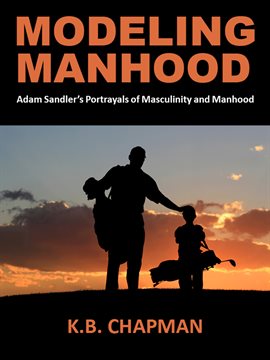
eBook
hoopla Instant
Modeling Manhood
Year
2015
Language
ENGLISH
Publication Information
BookBaby
Summary
K.B. Chapman spent over three years studying and analyzing the filmography of Adam Sandler in preparation for her Master's Thesis. In Modeling Manhood: Adam Sandler's Portrayals of Masculinity and Manhood, she provides a concise look into the thinking behind the films. Her analyzation of Sandler's characters and the females he is attracted to in each film became a study in gender dynamics. Chapman avoids typical feminist rhetoric, looking instead through a lens of intelligent common-sense reasoning about day to day performances of masculinity in late twentieth- and early twenty-first-century America. This book is invaluable to students of gender, sociology, psychology, and film, as well as to news and entertainment reporters and critics. Modeling Manhood: Adam Sandler's Portrayals of Masculinity and Manhood is a study of Sandler's character formation as he grew up in late 20th century America. The book examines the influences of American popular culture, politics, and current events on that formation, as well as the mentoring role Sandler's father played. Sandler himself acknowledges his father as, "My father, my mentor, my teacher, my coach, my idol, my hero, my family's leader, my mom's best friend, and by far, the coolest guy I have ever known." Chapman argues that these are the character qualities Adam learned from his father; the traits he associates with ideal fatherhood. They are what drive his efforts to influence ideas of masculinity, manhood, and fatherhood. The book also explores the recurring themes and characterizations used to reinforce Sandler's message: the bully, the sensitive guy, the man-child, LGBT acceptance, the jock, college education, and engaged fatherhood to communicate the values his father imparted to him. Sandler's films are often criticized for being moronic, but if one looks past the extended adolescent buffoonery shown at the beginning of most of his films, to the maturation process, and ultimately to manhood, it becomes evident that he is attempting to teach his audience that the most successful form of manhood is one that includes a college education, a responsible form of employment, and a committed relationship. His goal is to contribute to the ongoing conversation about what it means to be a man, and his portrayals of masculinity are in effect, efforts to mentor males of all ages into mature manhood. Chapman's in-depth reviews of Grown Ups, I Now Pronounce You Chuck and Larry, Spanglish, and The Waterboy give readers insight into what film scholar Timothy Shary calls the "challenge to perceived norms about sexuality and sexual preference, social identities and expectations, power and strength, and the very essence of what 'being a man' means."